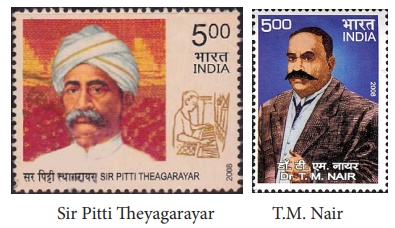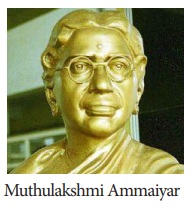Social Transformation in Tamil Nadu - South Indian Liberal Federation (Justice Party) | 10th Social Science : History : Chapter 10 : Social Transformation in Tamil Nadu
Chapter: 10th Social Science : History : Chapter 10 : Social Transformation in Tamil Nadu
South Indian Liberal Federation (Justice Party)
South Indian
Liberal Federation (Justice Party)
On 20 November 1916 around 30 prominent non-Brahmin
leaders including Dr. C. Natesanar, Sir Pitti Theyagarayar, T.M. Nair and Alamelu
Mangai Thayarammal came together to form the South Indian Liberation Federation
(SILF). In the meantime, at a meeting held in the Victoria Public Hall the
Non-Brahmin Manifesto was released in December 1916. The manifesto articulated
the voice of the non-Brahmin communities.
The
association started publishing three newspapers: Dravidian in Tamil, Justice
in English and Andhra Prakasika in
Telugu, to propagate the ideals of the Party.
The first election, under the Montagu-Chelmsford
Reforms, was held in 1920 after the introduction of the Dyarchy form of
government in the provinces. The Justice Party won the election and formed the
first-ever Indian cabinet in Madras. A. Subbarayalu became the Chief Minister
of the Madras Presidency and the party formed the government during 1920–1923
and 1923–1926.

In the
context of Congress Party boycotting the legislature, the Justice Party
continued to remain in office till 1937 elections were held. In the 1937
elections the Indian National Congress contested the elections for the first
time and trounced the Justice Party.
Programmes and Activities
The Justice Party is the fountain head of the
non-Brahmin Movement in the country. The Justice Party government widened
education and employment opportunities for the majority of the population and
created space for them in the political sphere.

The Justicites removed the legal hindrances
restricting inter-caste marriages and broke the barriers that prevented
Depressed Classes from the use of public wells and tanks. The
Justice Party government ordered that public schools accommodate the children
of the Depressed Classes. Hostels were established for the students belonging
to this social group in 1923. In the meantime, the Madras legislature under the
Justice Party government was the first to approve participation of women in the
electoral politics in 1921. This resolution created space for woman and thus
facilitated Muthulakshmi Ammaiyar to become the first woman legislator in India
in 1926.
The
Justice Party worked towards legislating provisions for communal representation
– reservations for various communities. Two Communal Government Orders (16
September 1921 and 15 August 1922) were passed to ensure equitable distribution
in appointments among various castes and communities as a part of achieving
social justice. The Justice Party rule established the Staff Selection Board in
1924 for the selection of government officials and encouraged all the
communities to share the administrative powers. In 1929, the Government of
British India adopted the pattern and established the Public Service
Commission.
The
Justice Party further concentrated on reforms in religious institutions. The
Justice Party introduced the Hindu Religious Endowment (HRE) Act in 1926 and
enabled any individual, irrespective of their caste affiliation, to become a
member of the temple committee and govern the resources of the religious
institutions.
Related Topics